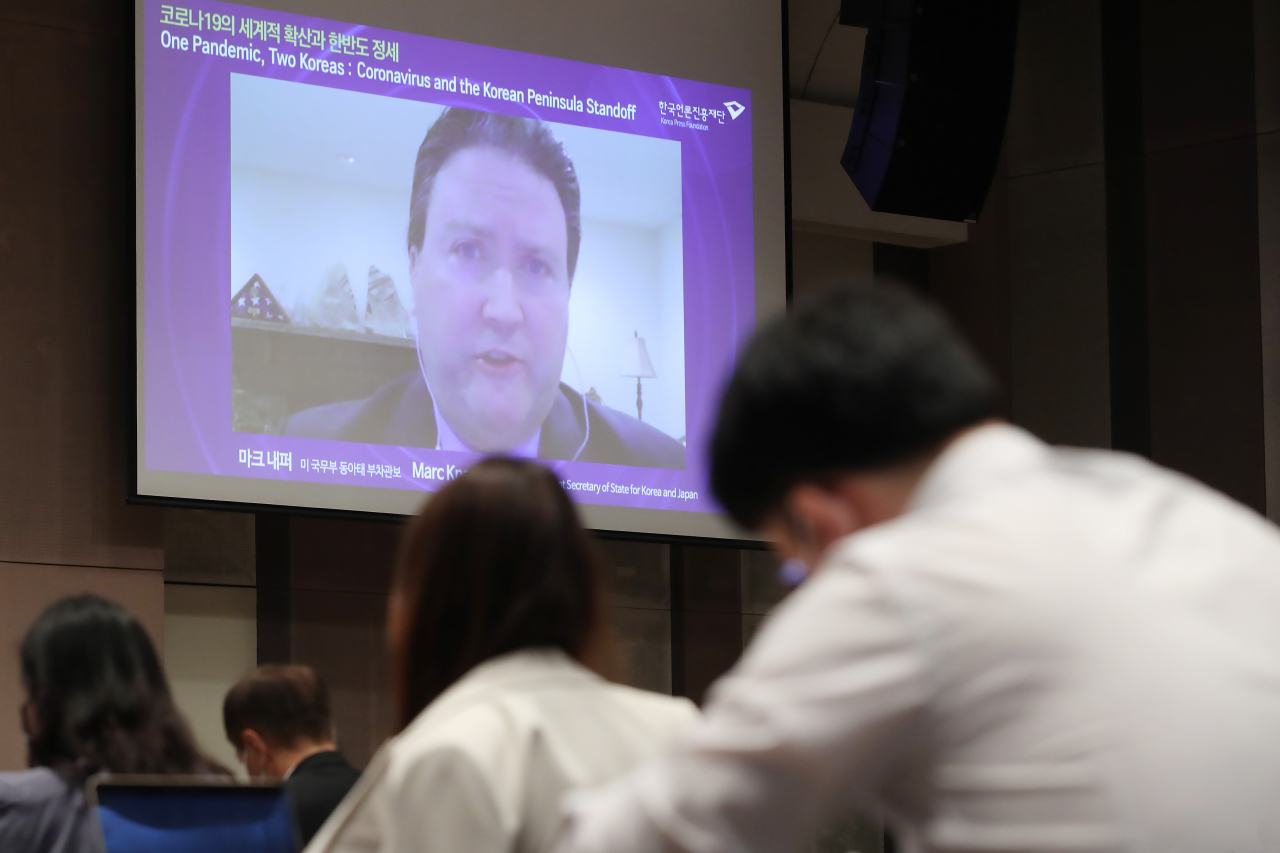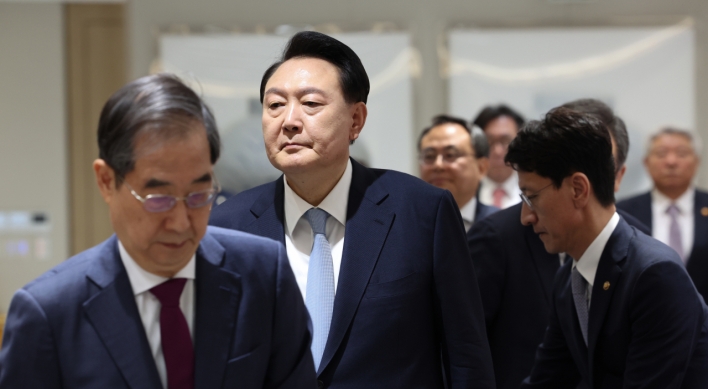
Amid deadlocked defense cost-sharing talks between Seoul and Washington, a senior US official on Wednesday said both the sides are “committed” to hammering out an agreement, while stressing the stance of “fair share of burden” among allies.
“For sure we are working very hard to bring a closure to this. We’d prefer that we wrapped this up several months ago, but both sides are committed to make this happen,” Marc Knapper, deputy assistant secretary of state for Korea and Japan, said via video conferencing during a forum hosted by the Korea Press Foundation and East-West Center in Seoul.
“Both of our leaders are fully engaged on this. …But as allies, we are both compelled to find a way forward and we will find a way forward, and I am very confident of that,” he said.
Despite seven rounds of talks since September toward renewal of the Special Measures Agreement, the pact that governs the upkeep of the roughly 28,500-strong US Forces Korea, the two sides failed to clinch a deal, largely due to differences over the amount that Seoul should pay.
They were close to reaching an agreement, until US President Donald Trump rejected what Seoul called its “best offer” of 13 percent hike from last year’s SMA of around 1.04 trillion won ($846 million). The US has asked Seoul to pay around $1.3 billion a year -- an increase of about 50 percent from the previous year.
On such a “Trump factor” affecting the outcome of the deal, Knapper stressed the president’s stance of “fair share of burden” with American allies, that could give less burden on the US taxpayers.
“Trump has made it very clear, and he made this very clear during his election campaign that he wanted, working with our allies, to figure out the way to have a fair share of burden among allies, such as South Korea, and others, whether in Northeast Asia or Europe, to lessen the burden on American taxpayers,” he said.
“So that’s what we are doing,” he said. “We wanted to do it in a way that’s respectful and we want to do it in a way that’s hopefully not too public, but that ultimately will benefit the alliance, and strengthen our abilities as allies and ultimately will ensure we got a fair share of burden between our countries.”
Ko Yun-ju, director-general for North American affairs at the Ministry of Foreign Affairs, reiterated South Korea’s stance that the cost-sharing should be “reasonable and fair.”
“It is undesirable for this impasse to last long,” said Ko. “At this time, the negotiators are continuing to discuss over phone and email. I think it’s important for both the sides to reach a landing zone that could be agreed mutually.”
Ko added the both the sides agree that the deal needs to be reached within this year.
Despite not able to reach an accord, the two sides stressed that the alliance is stronger than ever with expanded economic cooperation and in response to coronavirus.
“In comparison to any other administration, the conversation between the two heads of state and high-level officials are taking place better than any other time,” said Ko. “In a critical situation of COVID-19, the two countries’ joint responses are from our partnership.”
“One discovers the quality of an alliance during a crisis, and I think during this pandemic, we really discovered how deep and broad and trustful the US-ROK relationship is,” said Knapper, citing test kits and mask provisions by Korea, as well as information sharing and economic cooperation on COVID-19 outbreak. “I think lot of this is thanks to high-level communication and cooperation we enjoyed and lot of it is also due to the long history of the two countries in terms of health cooperation.”
In regards to stalled denuclearization talks between US and North Korea, Knapper declined to speculate what Pyongyang’s intentions are, but stressed Washington’s stance on upholding the 2018 Singapore declaration between Trump and North Korean leader Kim Jong-un.
“What I will say is the US policy right now is to leave the door open to diplomacy and that we remain committed to our efforts that began in Singapore, continued through Hanoi and through several other lower-level meetings,” he said. “Our goal remains to fulfill the spirit of the Singapore declaration, which includes dismantling the North’s nuclear program and missile program but also bringing peace to the peninsula to transforming the US-North Korea relationships.”
By Ahn Sung-mi (sahn@heraldcorp.com)









![[KH Explains] How should Korea adjust its trade defenses against Chinese EVs?](http://res.heraldm.com/phpwas/restmb_idxmake.php?idx=644&simg=/content/image/2024/04/15/20240415050562_0.jpg&u=20240415144419)









